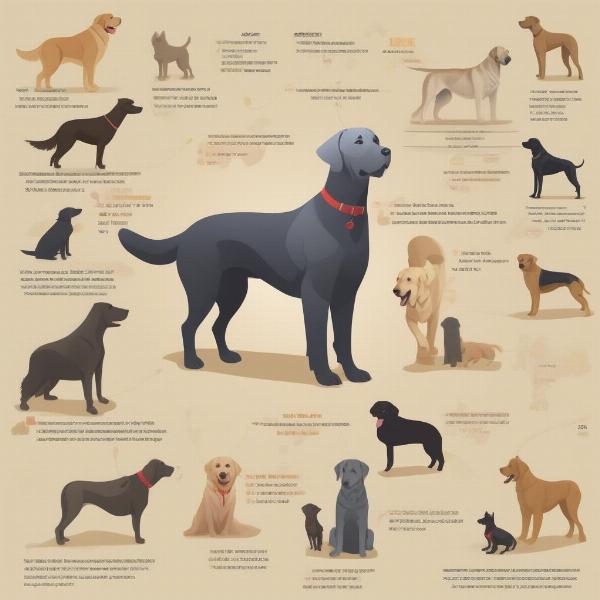Big dog coon light is a phrase that sometimes pops up in online searches, often leading to confusion. While “big dog” clearly refers to large canine breeds, “coon light” doesn’t have a direct connection to dog care. This article will explore the potential user intent behind this search, offer valuable information about caring for large dog breeds, and debunk any misconceptions related to the term “coon light.” We aim to provide clarity and practical advice for large dog owners and those considering bringing a big furry friend into their lives.
Choosing the Right Big Dog Breed for You
 Choosing the right big dog breed
Choosing the right big dog breed
Deciding to welcome a large dog into your family is a big commitment. Before you fall in love with a fluffy giant, consider your lifestyle, living space, and experience with dogs. Some large breeds are naturally more energetic and require significant exercise, while others are more laid-back. Researching breed-specific traits, like grooming needs and potential health issues, is crucial. For instance, a Great Dane will have different needs than a Newfoundland. names for big eared dogs might be a good resource if you’re attracted to breeds with prominent ears.
Understanding the Responsibilities of Big Dog Ownership
Owning a large dog comes with unique responsibilities. Their size means they need more space, more food, and often, more specialized training. They can also be more expensive to care for, especially when it comes to veterinary bills. Are you prepared to handle the strength of a large dog on a leash? Can you provide adequate space for them to exercise and play? These are important questions to ask yourself before making a decision.
Nutrition and Feeding for Large Breeds
Large breeds have specific nutritional requirements to support their bone and joint health. High-quality dog food formulated for large breeds is essential. These formulas often contain ingredients like glucosamine and chondroitin to help maintain healthy cartilage. Avoid overfeeding, as obesity can exacerbate joint problems and lead to other health issues. Consult your veterinarian for personalized dietary recommendations based on your dog’s breed, age, and activity level.
Avoiding Common Health Problems in Large Dogs
Large dogs are prone to certain health conditions, such as hip dysplasia, elbow dysplasia, and bloat. Regular veterinary checkups, a balanced diet, and appropriate exercise can help mitigate these risks. Maintaining a healthy weight is crucial for preventing joint issues. Be mindful of the type of exercise your dog gets, especially during puppyhood, to avoid stressing developing joints.
Training and Socialization for a Well-Behaved Big Dog
Early socialization and training are vital for large dogs. Proper training ensures they are well-behaved and safe to be around. Enrolling in puppy classes can be beneficial for both you and your dog. Consistency and positive reinforcement are key to successful training. A well-trained large dog is a joy to be around, while an untrained one can be a challenge to manage. large dog plush toys can be helpful tools for training and play.
Conclusion
Choosing to bring a big dog into your life is a rewarding experience. By understanding the responsibilities involved and providing proper care, you can ensure a long, happy, and healthy life for your furry companion. Remember that “coon light” has no relevance to dog care. Focus on providing your large dog with the love, attention, and resources they need to thrive.
FAQ
-
What are some good large dog breeds for first-time owners? Breeds like Golden Retrievers and Labradors are often recommended for first-time owners due to their generally friendly and trainable nature.
-
How much should I feed my large dog? Feeding guidelines vary depending on breed, age, and activity level. Consult your veterinarian for personalized recommendations.
-
What are the most common health problems in large dogs? Hip and elbow dysplasia, bloat, and certain types of cancer are more common in large breeds.
-
How can I prevent my large dog from developing joint problems? Maintaining a healthy weight, providing appropriate exercise, and feeding a balanced diet can help prevent joint issues.
-
How important is socialization for large dogs? Early socialization is crucial for ensuring your large dog develops into a well-adjusted and friendly companion.
-
What are the benefits of crate training a large dog? Crate training can provide a safe and secure space for your dog, aid in housetraining, and prevent destructive behaviors.
-
How can I find a reputable breeder of large dog breeds? Researching breed-specific rescue organizations and contacting local kennel clubs can help you find reputable breeders.
About ILM Dog
ILM Dog is your trusted international resource for all things dog-related. We offer expert advice on dog breeds, health, training, nutrition, grooming, and much more. Whether you’re a seasoned dog owner or just starting out, ILM Dog provides valuable insights to help you navigate every stage of your dog’s life. From choosing the right breed to understanding their nutritional needs, we’re here to support you. We specialize in guiding you through Dog Breeds and Selection, offering tips on Health and Medical Care, and helping you with Training and Behavior. Learn more about proper Nutrition and Feeding, essential Grooming and Hygiene, and finding the best Products and Accessories. Contact us today for personalized advice! Email: [email protected], Phone: +44 20-3965-8624.